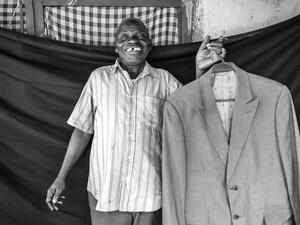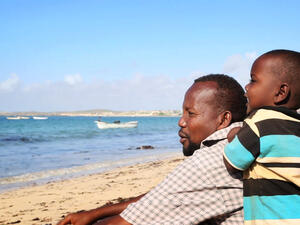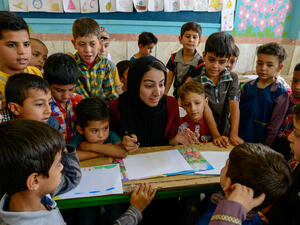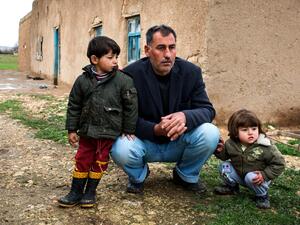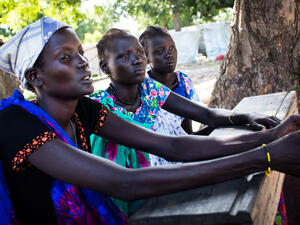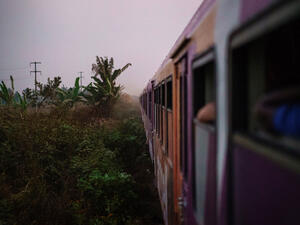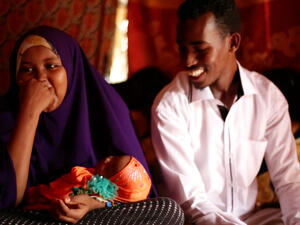Refugee returns to Equateur and South Kivu provinces of DRC pass 10,000 mark
Refugee returns to Equateur and South Kivu provinces of DRC pass 10,000 mark
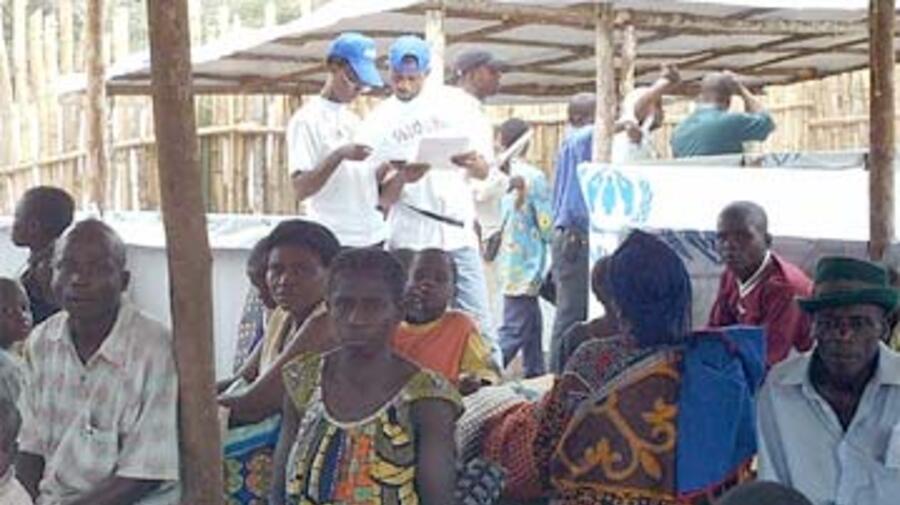
UNHCR's voluntary repatriation of Congolese to Equateur Province in the Democratic Republic of the Congo passed the 10,000 mark.
DONGO, DRC, 8 Feb (UNHCR) - The UN refugee agency's voluntary repatriation programmes to two separate provinces of the Democratic Republic of the Congo (DRC) each passed the 10,000 mark this week as Congolese refugees return to areas of the vast country where security has improved.
A total of 255 Congolese crossed River Oubangui to Dongo from the neighbouring Republic of Congo (RoC) on 7 February, the 57th convoy since UNHCR's facilitated returns to Equateur Province started last April. Some 10,240 Congolese have now been safely delivered to their villages in Equateur, Africa's biggest rainforest.
This was followed on Wednesday by the UNHCR voluntary repatriation to DRC's South Kivu Province from Tanzania also crossing the 10,000 mark. A total of 10,161 refugees have been assisted to return by boat to the province since that operation started in October.
Repatriation to DRC is complex. The first UNHCR voluntary repatriation was from Central African Republic - 1,941 assisted returns in 2004. The UN refugee agency in DRC also plans to add repatriation both from and to Sudan next month. However, other areas of DRC remain too unstable to begin returning refugees.
Among the Congolese returnees to Equateur on Tuesday were women who, for most of their stay in RoC, trained as tailors. "On arrival, we were happy and confident that the tailoring skills we acquired in RoC will not go to waste," one woman said.
"Our return home has changed the desperate life that we lived in exile," said another woman. She noted a number of assistance activities that have taken off to help reintegrate those coming home. UNHCR has rehabilitated some damaged return routes plus schools and health centres in main return areas. Shelter has been provided to the vulnerable.
"Before deciding to return, we were worried about how to find the means needed to rebuild our house, which was destroyed by the war," said a woman whom UNHCR provided with a house, appealing to those who are still in exile to come back home.
Returnees receive a start-up pack that includes food for three months, non-food items such as blankets, sleeping mats, a kitchen set and shelter kit containing a machete, saw, hammer, roofing nails and plastic sheeting. Tools and seeds for planting are essential for the returnees to start a new, sustainable life in Equateur where the effects of war can still be felt three years after the conflict.
UNHCR has created transit centres at which returning communities either overnight or undergo immigration procedures and screening for medical and social assistance needs.
"Logistical difficulties have slowed down movements either because of the shallow waters on the river that do not allow bigger boats or by the damage to the gravel roads caused by excessive rains. Floods wash away wooden bridges, which also contribute to late arrival of assistance packages," said UNHCR's representative in DRC, Eusebe Hounsokou
But he noted that more areas formerly under militia control are beginning to open up. Eusebe said UNHCR in mid-January 2006 evaluated security conditions in Buburu, a return area located on River Oubangui where 35,000 Congolese had fled the war.
"The military have vacated the area, while residents reported reduced harassment, which was the case when the military was occupying the area," Eusebe said. As a result, the UNHCR representative predicts returnee numbers to Equateur will rise during the course of 2006.
Equateur Province was the second area in the DRC where UNHCR began facilitating repatriation, after the modest returns from CAR in 2004. Returns to South Kivu from camps in western Tanzania, which shelter some 150,000 Congolese, started last October. Including Congolese refugees who returned on their own, more than 52,000 people have returned to the whole country since October 2004.
In addition, on 30 January 2006, UNHCR and the governments of Sudan and the DRC signed two separate agreements to start facilitated returns of refugees from both countries. For up to four decades, 6,800 Congolese have lived in South Sudan, while 13,000 Sudanese had fled fighting to north-eastern DRC. Movements to and from both countries are expected to start next month.
"We hope that conditions in other areas of the DRC will soon improve to allow for organised returns to start," said Eusebe. About 45,000 Congolese from Katanga Province are in Zambia, but the continuing insecurity does not encourage returns there to start any time soon.
Politically, however, the DRC has made significant strides towards restoring peace and expanding state authority over its vast territory. It is assisted by UN peacekeeping forces who have a mandate to end armed hostilities.
Preparations for elections also appear to be on course. On 18 December, 84 percent of eligible Congolese voted in favour of a new constitution, setting the way for the DRC to hold the first democratic elections in 45 years.
By David Nthengwe in Dongo, Democratic Republic of the Congo


